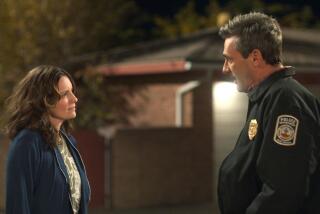A Designated Parental Interpreter to Help Cope With Cinematic Perils
- Share via
Have you taken the family to a movie lately? If you’re like us--and most of the families we know--the answer is yes.
I’m not sure why exactly, but we have seen more first-run movies so far this summer than we did in all of last year, in addition to our usual fare of slightly stale movies on cable or videotape. And every one of those movies has carried a version of the warning: “Parental Guidance Suggested.”
Some of the films earned their PG or PG-13 rating with “adult language.” For others, it was violence or “mature subject matter.”
A lot of parents complain that there are far too many PG movies out there. To some extent, I agree. I think it’s ridiculous to toss in rough language, sex scenes or violence just to get a film a more restricted--and more marketable--rating.
But as a concerned parent, movies are the least of my worries. To me, the whole world is rated PG. If children have made it as far as the fourth grade in a county public school, you can bet they have heard all the words that could turn up in any R-rated movie, let alone a PG--most likely from their own peers.
They may not understand the meaning of all those words, but they have heard them.
For another thing, there is enough violence in some G-rated movies to give a kid nightmares for weeks. I was shocked a couple of years ago when I took a carload of kids to see Disney’s “The Black Cauldron.” That movie had skulls, blood and terrifying battle scenes, and I don’t think it helped much that they were animated instead of live-action scenes.
Who can forget Snow White’s frantic run through the forest, where the shadows turned the trees into monsters not unlike those lurking in most kids’ closets at night? And the death of Bambi’s mother--is there a child who did not worry for days afterward that something could happen to his own mother?
Even “Peter Pan,” the latest of the classic Disney G-rated films to be recycled, features a man-eating alligator and a girl who gets tied up and nearly killed.
To me, parental guidance does not just mean deciding whether to allow a child to see a questionable film. It means being there as much as possible to help children interpret what they see, whether in a movie, on TV or even--make that especially--in real life.
It also means recognizing that you cannot always be there to censor or explain, so there are times when parental guidance has to be applied retroactively.
My daughter, then just 9, was once shown a slasher film at a friend’s slumber party. (There seemed to have been very little in the way of parental guidance going on that night.) She woke up screaming in the middle of the night at least once a week for months afterward.
Telling her, “It’s only a movie” did not solve the problem completely, but at least I could say it. A few months after that, when the teen-age friend-of-a-friend disappeared and was found murdered several days later, I had to look for other ways to reassure my children.
When I’m really in doubt as to whether my children should see a particular movie, I try to preview it first to be sure--even if that means I end up going twice, at $6 a ticket.
Take “Batman.” All the reviews I read cautioned that the PG-13 rating is to be taken seriously because of the violence. So I was surprised to see so many young children in the audience the night the movie opened. That’s a chance I would not have taken even with my children, now 11 and 13.
But after seeing it, I decided to go ahead and take them, explaining beforehand that the Joker was a really, really bad guy and that he did some really, really bad things.
“Batman’s” violence did not seem to bother them nearly as much as the death of a single ant in “Honey, I Shrunk the Kids.”
And they did not seem to blink at the scenes of faces melting into skulls in the most recent Indiana Jones movie. But in the second feature we saw that night, “The Naked Gun,” I had to think fast when we heard Leslie Nielsen say, “I faked every orgasm.”
“Mom, what does that mean?” my daughter asked.
“Um. Uh, well, he’s just trying to say he didn’t like being with her as much as he seemed to.”
“Oh.”
I had seen that movie without the kids too, months before. But I had not remembered that part.
I don’t think my daughter learned very much from my explanation, but she had no more questions. For me, the experience was a reminder of a lesson I am learning all the time: No matter how you try, you cannot protect your kids from everything. All you can do is deal with what happens, when it happens, and do your best to teach them to do the same.
More to Read
Only good movies
Get the Indie Focus newsletter, Mark Olsen's weekly guide to the world of cinema.
You may occasionally receive promotional content from the Los Angeles Times.










